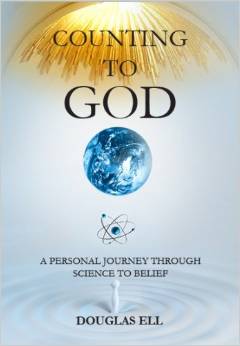 Faith & Science
Faith & Science
 Intelligent Design
Intelligent Design
Counting to God: New Book by Douglas Ell Introduces the Evidence for Intelligent Design
 A lot of books — many of them very good — have been written about the debate over intelligent design. But rarely does one come along that combines a compelling story of the author’s personal journey to faith with a well-written, comprehensive, easy-to-read presentation of the scientific evidence. Lee Strobel’s 2004 Case for a Creator comes to mind, but that is now ten years old and it’s never too soon for an update. As a result, I’m pleased to recommend an outstanding new book: Counting to God: A Personal Journey through Science to Belief, by Douglas Ell.
A lot of books — many of them very good — have been written about the debate over intelligent design. But rarely does one come along that combines a compelling story of the author’s personal journey to faith with a well-written, comprehensive, easy-to-read presentation of the scientific evidence. Lee Strobel’s 2004 Case for a Creator comes to mind, but that is now ten years old and it’s never too soon for an update. As a result, I’m pleased to recommend an outstanding new book: Counting to God: A Personal Journey through Science to Belief, by Douglas Ell.
Doug Ell is an attorney in Washington, D.C., with an undergraduate degree in math and physics from MIT, and a master’s degree from the University of Maryland in theoretical math. You’ll have to read the book to learn Doug’s entire story. He was born into a religious home, but by the time he started college, he had drifted away from his upbringing, which he came to see as outdated superstition. As an undergraduate student, he embraced scientism — the view that scientific investigation is the only means of discovering real truth. Sometime later, however, Doug was introduced to the scientific theory of intelligent design, and everything began to change.
Counting to God tells Doug’s story, but it also recounts key lines of evidence that support the theory of intelligent design and challenge materialist explanations of cosmic and biological origins. Ell presents what he calls the “seven wonders” of science of the new millennium:
- The universe had a beginning, and a first cause, some 14 billion years ago.
- The universe is finely tuned for life.
- The complexity of life could not arise through unguided processes.
- DNA contains information and biological machines.
- New species appear suddenly in the fossil record.
- Earth is a special planet, uniquely suited to life.
- Quantum physics points to a reality outside of space and time.
Ell surveys the evidence in each of these areas, discussing other intriguing topics along the way, including the multiverse, junk DNA, irreducible complexity, orphan genes, and near-death experiences. All this leads to what he calls “the great question”:
Do you think we live in a meaningless universe, and human beings were created by accident? Or do you think we live in a universe designed and created by a great intelligence, and human beings were designed? Accident or design — that is the question.
As an attorney, Ell is well aware that answering this question meaningfully requires a free and fair presentation of all the evidence. He notes that one thing that drove him to the ID viewpoint was learning about the “discrimination” and “violations of intellectual freedom” faced by ID proponents. He writes about how this left him “feeling a little angry, and a little ashamed of the scientific community.” He asks: “What was wrong with discussing the mere possibility of design?” He thus issues a challenge to his readers:
You have a choice. You can impartially consider new scientific evidence as it becomes available and revise your opinions as dictated by facts. Or you can do what most people do, just go with the existing paradigm. I’m asking you to have the courage to explore the harder path. I’m asking you to consider the evidence, some of the most sophisticated results of modern science, and make your own decision.
Ell insists, “All I am suggesting is free and open debate, and that we recognize Scientism as a belief.” If you feel ready to take the challenge, Counting to God is a great place to start.
